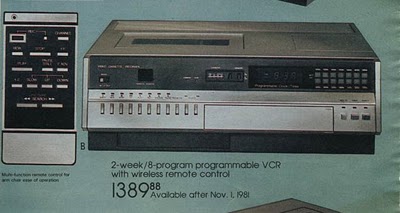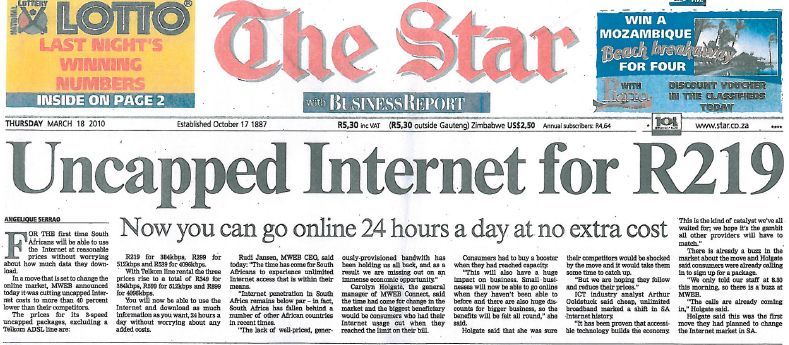 Joe Brown was obviously not the right person for G4TV’s Attack of the Show to talk to about the issue of Internet Overcharging.
Joe Brown was obviously not the right person for G4TV’s Attack of the Show to talk to about the issue of Internet Overcharging.
As AT&T begins notifying their DSL and U-verse customers they are about to face usage limits on their broadband service, G4TV sought out reaction from the features editor of Gizmodo.com, who was wholly unprepared to inform viewers about the facts behind AT&T’s usage caps and their implications for customers.
While Brown and G4TV were joking about users having to curtail game downloads, for millions of AT&T customers, it’s no laughing matter.
AT&T’s announced 150-250GB limits will eventually cost customers $10 or more for each extra 50GB allotment, on top of their already-expensive broadband service package.
“It really had to happen eventually I think,” Brown told viewers. “People are using a lot of bandwidth.”
But Brown’s observation conflicts with AT&T’s own claim “only a tiny minority of customers” will use more than the company wants to allow, with the average AT&T customer consuming 18GB per month. AT&T isn’t telling the full story about that either.
For those “heavy users” AT&T wants to restrict first, the implications go well beyond curtailing Netflix and playing online games.
“As a software developer who works under a Linux environment and is forced to telecommute from home one week per month, these caps would absolutely kill me,” writes Joe Stein from Sparks, Nev. “If you are a retired person using your computer to check e-mail and browse the headlines, you will obviously never exceed AT&T’s caps, but for technology innovators and those like me in the software development field, 150GB is nothing.”
Stein downloads regular updates for Linux, exchanges software back and forth with the office several times a day, and uses video conferencing regularly when he works from home.
“Not all online video is about adult entertainment or downloading movies,” Stein says. “Usage caps hurt anyone who has to work with large files or business-related video, and after the events this week, AT&T can afford to leave off the caps.”
Brown claims AT&T conducted “a study” in two cities which found that 98 percent of their customers used far less than the usage caps would allow. What Brown does not know is that those two cities are Beaumont, Texas and Reno, Nevada — hardly superstars in the tech revolution.
“Nobody moves to greater Reno to be a software superstar, which is why I am in San Jose, Calif., all the time,” Stein says. “But there is more to this area than casinos.”
Stop the Cap! has been helping consumers in both cities avoid AT&T because the company’s “study” came at the same time it was experimenting with an Internet Overcharging scheme that limited customers to as little as 20GB of usage per month — a strong incentive for customers to avoid high bandwidth services, or better yet AT&T. So it’s no surprise broadband users who know better chose an alternative provider, including Stein.
“I first became aware of the usage cap debacle a few years ago when AT&T tested usage caps in the Reno area, which covers Sparks,” Stein says. “I saw the impact first hand when customers started getting notified they would have to pay substantially more for basic Internet service.”

AT&T first limited their broadband customers to as little as 20GB of usage per month, then claimed the average customer only uses 18GB, making their 150GB DSL cap "generous."
Stein left for the cable company — Charter Communications, and they have usage caps too, but they are rarely enforced and much higher than what AT&T offers DSL customers, Stein says.
Brown claims AT&T is trying to “get out ahead of people using too much,” a point in conflict with the fact AT&T is willing to sell consumers additional bandwidth on its “overcongested” network.
Brown’s suggestion that “bandwidth costs money” is partially true, but not in the context of AT&T’s usage limits. The company that can afford fiber optic upgrades to deliver limitless television and telephone service apparently cannot afford the pennies in bandwidth costs customers consume as part of their broadband service, which can run $50 a month or more.
Pondering broadband usage “fairness” is a losing proposition for consumers… and reporters, too.
Once someone blindly accepts the premise AT&T needs data caps, with no evidence usage presents a technical or financial challenge for the company, the debate is quickly reduced into a numbers game about “how much usage is fair.”
Clearly for Brown and his friends, who admit they are dangerously close to reaching or exceeding AT&T’s limits, the answer to Brown wondering aloud if the caps would “do it for him” should be no.
Stop the Cap! believes no cap is worth living with, especially on AT&T’s enormous-sized broadband network, now increasingly designed to handle the multimedia rich Internet and their U-verse platform.
It is doubtful many will be assuaged by Brown’s comments that “AT&T sounded pretty cool” about how they will deal with those who exceed their arbitrary usage limits. Why? Because after the “fair warnings” AT&T will provide customers on its artificially limited network, they will drop the sledgehammer of higher bills on top of customers’ heads.
Brown should know better, especially after finding AT&T unwilling to discuss how often it intends to revisit its usage cap levels. AT&T’s counterparts in Canada have already foreshadowed the answer. Once the cap regime is in place, several companies lowered them, sometimes repeatedly, to further monetize broadband usage. They also raised the prices of overlimit fees, often substantially.
AT&T depends on uninformed consumers and reporters not understanding the true facts about Internet Overcharging schemes. It’s not too late for reporters like Joe Brown to undo the damage, however.
Stop the Cap! strongly encourages everyone to examine the evidence we have compiled here over the past two and a half years. It’s not hard to discover AT&T’s usage caps have nothing to do with fairness, are arbitrary and unnecessary, and come as a result of providers seeking higher profits in an undercompetitive marketplace.
If we do not uniformly and loudly oppose usage limits, America’s broadband rankings, digital economy innovation, and high technology jobs are all at risk, just to satisfy AT&T’s insatiable appetite for higher profits.
(P.S. – Joe: How did you miss Comcast has been capping their customers at 250GB for two years now. Say it ain’t so, Joe!)
[flv width=”480″ height=”380″]http://www.phillipdampier.com/video/G4TV Attack of the Show ATT Caps Their Data Usage 3-15-11.flv[/flv]
G4TV’s ‘Attack of the Show’ misses the boat on AT&T’s Internet Overcharging scheme. They did better covering Time Warner Cable’s attempt at Internet Overcharging in 2009. It’s time to revisit this issue and get involved in the fight that could hurt the very audience watching this show. (6 minutes)


 Subscribe
Subscribe








